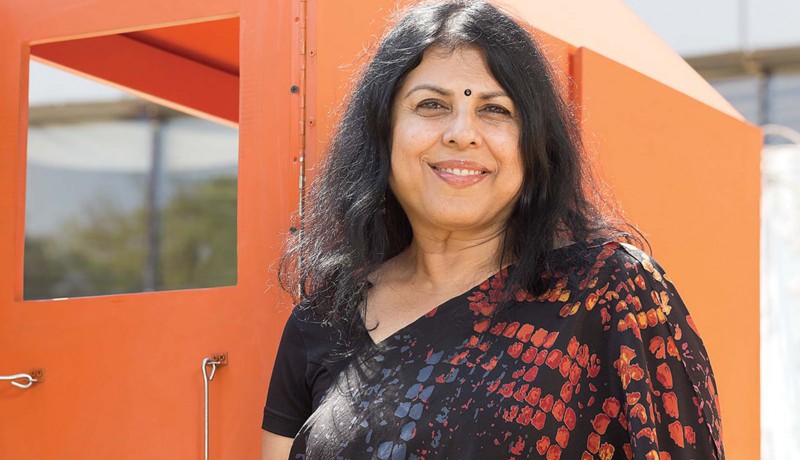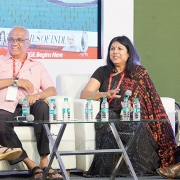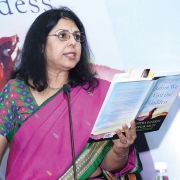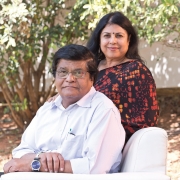
People

Prolific, positive and passionate, Chitra Banerjee Divakaruni places women firmly at the centre of her literary canvas, crafting her characters with empathy and compassion and reflecting a deep understanding of the human story, writes Arati Rajan Menon
This January, in its 10th edition, the Jaipur Litfest was less literary event and more jamboree. With an international cast of authors spanning geographies and genres, the charming Diggi Palace could barely contain the surge of humanity—from scribes and students to socialities and selfie-seekers—that invaded its expansive grounds.
On the morning of Day 2, the Front Lawn of the Palace, the largest of its six venues, was the epicentre of action, people packed like sardines, standing room only for tardy arrivals. “I’m a little nervous,” confessed Chitra Banerjee Divakaruni as she took the stage to discuss her new book, Before We Visit the Goddess (Simon & Schuster; ₹ 375; 210 pages). She needn’t have been—the welcoming roar she received from the audience kicked off an hour-long session of insight and inspiration, revealing the empathy that has made her so beloved an author.
Right from her debut novel, The Mistress of Spices (1997), through her body of work, including Sister of My Heart (1999) and, of course, The Palace of Illusions (2008), her retelling of the Mahabharata through Draupadi’s perspective that has gained her near rockstar status with younger Indian women, her focus as a writer has never wavered. “I always want women at the centre of my canvas,” she says. “I want her voice to be heard.” In her latest, …Goddess, we meet three generations of them —Sabitri, Bela and Tara—as Divakaruni takes us on an emotional crossing bridging countries and cultures, chance and circumstance, a journey as compelling as the spiritual voyage of her protagonists. “Life is a mixture of character and destiny,” she says, and this truth suffuses every page of this remarkable book.
Another theme that resonates through her oeuvre is the immigrant experience—drawing from a wellspring of memory, she paints poignant and extremely tactile pictures of the Indianness in each of us, the home within no matter how far we roam. “I took my own culture for granted when I lived in India,” says the 60 year-old, who left her native Kolkata to study in the US. She now lives in Houston with her husband Murthy; the couple has two sons, Anand and Abhay. “When you are overseas, even a snatch of music or a whiff of fragrance can spur a sense of longing and make you emotional. You want to remember everything.” In fact, she credits her very career to this need. “For me, writing was a personal action against forgetting,” she reveals. “My grandfather’s death was the trigger.”
She responded eagerly, and prolifically, writing stories and novels, essays, poetry, and even children’s fiction. Named by The Economic Times as one of the ‘Twenty Most Influential Global Indian Women’ in 2015, her books have been translated in an astounding 29 languages; her work has been published in magazines such as The Atlantic Monthly and The New Yorker; and her books, such as Mistress… and Sister…, have been adapted for the screen. In fact, Palace… will soon be adapted by filmmaker Aparna Sen, a source of considerable excitement for Divakaruni—and the crowd at the Jaipur Litfest if the lusty cheer the announcement received was any indication. “Our epics are alive,” she says, explaining the appeal of the book. “They remain part of our cultural, political and religious discourse. However, in the Mahabharata, weapons get more space than women. Draupadi is a fascinating character and it was wonderful telling her story, creating a balance between the original character and my creative interpretation of her.”
Inevitably enough, her next book will be a retelling of the Ramayana through Sita’s eyes, her version based on the Krittivasi Ramayan, a translation in Bengali composed by 15th century poet Krittibas Ojha. However, Divakaruni, who teaches creative writing at the University of Houston, refuses to take her craft for granted—she’s part of a writer’s group that meets regularly (often online) to bounce their work off each other. “I need to constantly review and revise my work,” she confesses. “Some days, you write something, the words just flow and you’re so happy. But the next day, you realise it really isn’t that good!” Her advice for aspiring writers: “You don’t have to be great from Day 1. You just need to keep at it.”
EXCERPTS FROM AN EXCLUSIVE INTERVIEW
Your latest book Before We Visit the Goddess is full of layers of meaning and nuggets of discovery. However, if you had to distil it to its basic essence, how would you describe it?
The book chronicles the spiritual journey of three generations of women. Ultimately, the Goddess lies within each of them but they have to undergo a process of discovery to understand their own sacred self. Also, the book explores what it takes for a woman to be successful and self-actualised across generations and geographies—what remains the same over time and space, and what is different.
In this book, you showcase a new style of writing with self-contained stories that ultimately all fit together, like a jigsaw puzzle.
I am so happy you saw that it’s like a puzzle; that’s exactly what I wanted to achieve. It was a real challenge for me. There were so many incidents I knew would come back at some point in the story, but I myself didn’t know when and where. This made writing the book harder, but more exciting!
Also, although the themes are familiar —women, the diaspora—there is a real newness and freshness to the characters….
Yes. Although I do write about immigrant life, it’s very important with each book to do something different. This was a bit of a departure with the three generations. Even among the cast, the character of Tara is very different from anyone I have written before, very contemporary and edgy.
In this book, chance encounters change lives. For me, three really stood out: when Leelamoyi invites Sabitri to come and stay with her, almost on a whim; when Bela, on a downward spiral, shows up by accident at the apartment of Ken, an American homosexual man; and, of course, Tara’s meeting with Dr V and their visit to the temple, her first ever, after which the entire book is named….
Absolutely, that is a big part of the theme. We think our lives are dependent on the choices we make, and to some extent they are. But a big element is chance. Life is so strange; one never knows what’s going to change your life. So we need to watch for these little signs, these transformative moments. As for Tara’s visit to the temple, I wanted to show how connected we are to our cultural and spiritual roots at a subconscious, subliminal level even if we don’t know it and feel cut off from them.
How much of you is in this book—or any of your books?
Well, there is the obvious immigrant experience, which I share, and I study and write about extensively. Other than that, it’s not really autobiographical; none of my books are. They are my characters, my creations, but they are not from my own life. I like to maintain that fictional distance because it allows me to be more imaginative.
Your characters are crafted with such care. When they are re-imagined on screen in an adaptation, have you ever felt justice hasn’t been done to them or the spirit of the book? And how involved are you in the creative process in these projects?
I’m always a consultant when my books are made into films. However, one has to respect that it is now the director’s baby. While some directors want more input, others just want to run with their ideas. Sometimes, I have felt that a small kernel of the story has been taken and made much bigger, so the balance is different. But you have to make way for the director’s vision. For instance, Suhasini Mani Ratnam made a version of Sister of My Heart and set it in a Tamil context and it worked beautifully. I’m really excited to see Aparna Sen’s take on Palace.
Your books have been translated in 29 languages. How do you explain their appeal across borders and cultures?
I think it’s because the human story is the human story, no matter which culture you are from. That’s one of the most wonderful things about literature; if you can tell the human story, it transcends time, it transcends language, it transcends geography. That’s certainly my experience as a reader. And my hope as a writer.
You’ve said many a time that immigration has made you a writer. Today, immigration is an incendiary issue with President Trump in the White House. How did you feel about his victory in this election and what is the way forward for Americans?
I believe we must respect the democratic process. He was not my choice for president but the election is over. I really don’t believe in negative thinking—it achieves nothing—and you can’t fight hate with hate. You know, someone once said there is a spiritual solution to every problem and I really believe that. Most important, the duty of writers is greater than ever before. Being a writer in an easy time is an easy task; now, it is more important to be a writer and be heard. We need to look ahead and work to create a multicultural conversation.
Indeed. While the world is a global village in so many ways, countries are also becoming increasingly insular and going back into the cocoon. It’s not just America—it happened with Brexit and it’s happening in so many European countries. Does this concern you?
Yes, countries are becoming very nationalist, insular, isolationist. However, I think these things come in waves; it’s not a lasting trend. It’s cyclical really; if you look back at history, there will be nationalistic moments. That wave will crest and fall because at some point, people realise that you really cannot live an isolationist life. But, meanwhile, are we just going to wait for the wave to crest and fall? No. So, what do we do as writers? We write. We write responsibly; we write to share the stories that people need to hear. And as public personalities, we have to speak out against hatred and prejudice. We need to demonstrate with our own lives that the clichés people believe in are not true.
This is the impulse that made you write for kids.
Yes, I started writing for children after 9/11. At the time, there was a backlash against our community because we looked a certain way. We became scapegoats and my children experienced racism. Thus, writing for children was a political action on my part; I wanted my children and children like them to feel empowered and proud again.
Another extension of your activism is your involvement with organisations that empower women like Daya, Saheli and Maitri, a helpline for South Asian women you co-founded.
Yes, Maitri has grown and we now literally have thousands of women involved. We help women suffering from all kinds of abuse, from domestic violence to trafficking. Unfortunately, there are significant situations of abuse even today as there is such a wide variety of immigrants. While some women are very educated and empowered, others come to the US just after marriage with little education and no job skills. With services like this, women get a chance to start their lives over.
Back home in India, too, while so many women are more empowered than ever before, aggression and abuse still continue. Just consider incidents like the one in Bengaluru on New Year’s. How do you explain it?
It’s somewhat of a mystery to me. You would think women moving ahead and contributing in so many areas creates a stronger society. But perhaps there is a backlash from men, a sense of being disempowered and having your privilege and years of entitlement taken away. It’s such mistaken thinking, though, because if one gender is equal in the eyes of the other, everyone is the better for it. There will be less pressure on men to be the wage-earners and problem-solvers—now, the other half of the equation is also doing so and it is healthy for children to see that growing up. We need to address these issues as a society and we need to address them early, when the children are young, at home and school.
Thinking out loud, I also think there’s such a disconnect between the lives of ordinary people and Bollywood, which overwhelms the public imagination in India. In these movies, the portrayal of women is unreal; it is pure objectification and the treatment of women as sex objects pervades the public consciousness. Movies that shatter stereotypes, like Pink, are unfortunately few and far between. And people who go to see them are already aware. It’s the mainstream movies that need to become more sensitive and less sexist.
Older women are even more marginalised in India today—a matter of concern in a society that prided itself on taking care of its elders.
You’re right. Older women are such a repository of wisdom and in our traditional culture, there was a real place for them. I remember going to the village when I was young and all the younger women would be learning from older women, whether it was a recipe or making diyas. Now, that mechanism is breaking down. In countries, like the US, there are institutional structures to take care of the elderly. Having said that, what works for one country may not work in another. Such structures need to be organic and customised and rooted in our own ethos. There are some organisations in the US now that are pairing older and younger people together. I hope we evolve more such mechanisms in India because I really do believe our older women have so much to give us.
Personally speaking, how has ageing informed your own life and work?
There’s this saying, ‘Youth is wasted on the young’—it’s so true; we take so much for granted. Growing older makes you realise the fragility and value of life. After my husband Murthy had his knee surgery, we were talking about how much we take something like mobility for granted. We have come to realise that every single day we are in good health is a gift; preservation of health has become a priority for us.
With age, my writing has also acquired a more spiritual dimension. One book always on my Kindle is the Bhagavad-Gita and I try to read a little bit from it each day. Some of the ideas from there have really influenced my work, especially the whole idea of our life journey being a spiritual search. That’s an underlying theme of this latest book too; three generations of women on a spiritual quest, although it takes them a while to recognise it.
After your book on Sita, is there any other genre you’d like to explore?
Yes, I want to do a murder mystery. I already have an idea for it at the back of my mind. It will be completely different from my other work. But you can be sure of one thing—it will have strong women characters. And it will be a woman who ultimately solves the mystery!
AWARDS
1995: The American Book Award for Arranged Marriage: Stories
1995: PEN Oakland/Josephine Miles Literary Award for Arranged Marriage: Stories
1997: The Allen Ginsberg Poetry Prize and the Pushcart Prize for poems in Leaving Yuba City
1997: Los Angeles Times Best Books of 1997 for The Mistress of Spices
2003: Pushcart Prize for The Lives of Strangers
2007: Distinguished Writer Award from the South Asian Literary Association
2011: Light of India Jury’s Award for Journalism and Literature
2015: Premio Scanno Award for Literature, Italy.
BIBLIOGRAPHY
Fiction
- Arranged Marriage: Stories (1995)
- The Mistress of Spices (1997)
- Sister of My Heart (1999)
- The Unknown Errors of our Lives (2001)
- The Vine of Desire (2002)
- Queen of Dreams (2004)
- The Lives of Strangers (2005)
- The Palace of Illusions: A Novel (2008)
- One Amazing Thing (2010)
- Oleander Girl (2013)
- Before We Visit the Goddess (2016)
Young adult and children
- Neela: Victory Song (2002)
- The Conch Bearer (2003)
- The Mirror of Fire and Dreaming (2005)
- Shadowland (2009)
- Grandma and the Great Gourd (2013)
Poetry
- The Reason for Nasturtiums (1990)
- Black Candle (1991)
- Leaving Yuba City (1997)
- Indian Movie, New Jersey
- Tiger Mask Ritual
Anthologies
- Multitude: Cross Cultural Readings for Writers (1993)
- We Too Sing America (1997)
- California Uncovered: Stories for the 21st Century (2004)
Photos: Prasad Durga Featured in Harmony — Celebrate Age Magazine March 2017
you may also like to read
-
For the love of Sanskrit
During her 60s, if you had told Sushila A that she would be securing a doctorate in Sanskrit in the….
-
Style sensation
Meet Instagram star Moon Lin Cocking a snook at ageism, this nonagenarian Taiwanese woman is slaying street fashion like….
-
Beauty and her beast
Meet Instagram star Linda Rodin Most beauty and style influencers on Instagram hope to launch their beauty line someday…..
-
Cooking up a storm!
Meet Instagram star Shanthi Ramachandran In today’s web-fuelled world, you can now get recipes for your favourite dishes at….










